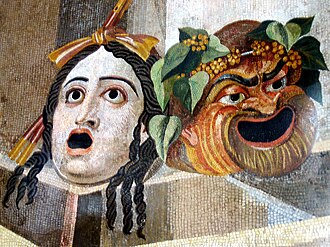Comedy





Comedy is a genre of film, theatre, and other forms of art that aims to entertain and amuse an audience through humor. Often contrasted with tragedy, comedy seeks to provoke laughter and provide enjoyment by exploring the quirks, follies, and eccentricities of life and characters. The origins of comedy can be traced back to ancient Greece, where it was one of two principal dramatic forms, the other being tragedy. Comedy has evolved through history, adapting to different cultures, societal norms, and audience preferences, resulting in a wide variety of sub-genres.
History[edit]
The earliest recorded comedies were the Greek comedies written in the 5th century BCE, notably those by Aristophanes. These early works often focused on satirizing public figures, the gods, and societal norms. During the Roman era, playwrights like Plautus and Terence adapted Greek ideas and created their own comedic works, which were more focused on plot and less on chorus singing and dancing.
In the Middle Ages, comedy found expression in forms such as the farce and the comedic plays of the Commedia dell'arte, an Italian tradition that relied heavily on improvised performances. The Renaissance period saw a revival of classical forms and the emergence of new comedic structures, with playwrights like William Shakespeare blending humor with more serious themes.
The 18th and 19th centuries introduced the comedy of manners and satirical works, reflecting the social mores and politics of the time. The modern era has seen comedy continue to evolve, with the advent of film, television, and stand-up comedy adding new dimensions to the genre.
Sub-genres[edit]
Comedy encompasses a range of sub-genres, each with its own distinct characteristics. Some of the most popular include:
- Slapstick: Characterized by physical humor and stunts.
- Romantic comedy: Focuses on relationships and love, often with a light-hearted tone.
- Satire and Parody: Uses humor to critique and mock societal norms, politics, and culture.
- Screwball comedy: Combines elements of romance and farce, known for fast-paced, witty dialogues.
- Black comedy: Deals with serious, taboo, or dark subjects in a humorous way.
- Stand-up comedy: A performance by a comedian delivering jokes and humorous stories to a live audience.
Cultural Impact[edit]
Comedy plays a significant role in culture by providing a way to deal with the complexities and challenges of life through humor. It can serve as a social commentary, highlighting issues within society, politics, and human behavior. Comedy also has the power to unite people across different backgrounds, as laughter is a universal human experience.
Notable Comedians and Contributors[edit]
Throughout history, many individuals have made significant contributions to the development of comedy. These include ancient figures like Aristophanes, medieval jesters, Renaissance playwrights like Shakespeare, and modern comedians and actors who have shaped the various forms of comedic entertainment we enjoy today.
See Also[edit]
Ad. Transform your life with W8MD's Budget GLP-1 injections from $75


W8MD offers a medical weight loss program to lose weight in Philadelphia. Our physician-supervised medical weight loss provides:
- Weight loss injections in NYC (generic and brand names):
- Zepbound / Mounjaro, Wegovy / Ozempic, Saxenda
- Most insurances accepted or discounted self-pay rates. We will obtain insurance prior authorizations if needed.
- Generic GLP1 weight loss injections from $75 for the starting dose.
- Also offer prescription weight loss medications including Phentermine, Qsymia, Diethylpropion, Contrave etc.
NYC weight loss doctor appointmentsNYC weight loss doctor appointments
Start your NYC weight loss journey today at our NYC medical weight loss and Philadelphia medical weight loss clinics.
- Call 718-946-5500 to lose weight in NYC or for medical weight loss in Philadelphia 215-676-2334.
- Tags:NYC medical weight loss, Philadelphia lose weight Zepbound NYC, Budget GLP1 weight loss injections, Wegovy Philadelphia, Wegovy NYC, Philadelphia medical weight loss, Brookly weight loss and Wegovy NYC
|
WikiMD's Wellness Encyclopedia |
| Let Food Be Thy Medicine Medicine Thy Food - Hippocrates |
Medical Disclaimer: WikiMD is not a substitute for professional medical advice. The information on WikiMD is provided as an information resource only, may be incorrect, outdated or misleading, and is not to be used or relied on for any diagnostic or treatment purposes. Please consult your health care provider before making any healthcare decisions or for guidance about a specific medical condition. WikiMD expressly disclaims responsibility, and shall have no liability, for any damages, loss, injury, or liability whatsoever suffered as a result of your reliance on the information contained in this site. By visiting this site you agree to the foregoing terms and conditions, which may from time to time be changed or supplemented by WikiMD. If you do not agree to the foregoing terms and conditions, you should not enter or use this site. See full disclaimer.
Credits:Most images are courtesy of Wikimedia commons, and templates, categories Wikipedia, licensed under CC BY SA or similar.
Translate this page: - East Asian
中文,
日本,
한국어,
South Asian
हिन्दी,
தமிழ்,
తెలుగు,
Urdu,
ಕನ್ನಡ,
Southeast Asian
Indonesian,
Vietnamese,
Thai,
မြန်မာဘာသာ,
বাংলা
European
español,
Deutsch,
français,
Greek,
português do Brasil,
polski,
română,
русский,
Nederlands,
norsk,
svenska,
suomi,
Italian
Middle Eastern & African
عربى,
Turkish,
Persian,
Hebrew,
Afrikaans,
isiZulu,
Kiswahili,
Other
Bulgarian,
Hungarian,
Czech,
Swedish,
മലയാളം,
मराठी,
ਪੰਜਾਬੀ,
ગુજરાતી,
Portuguese,
Ukrainian
